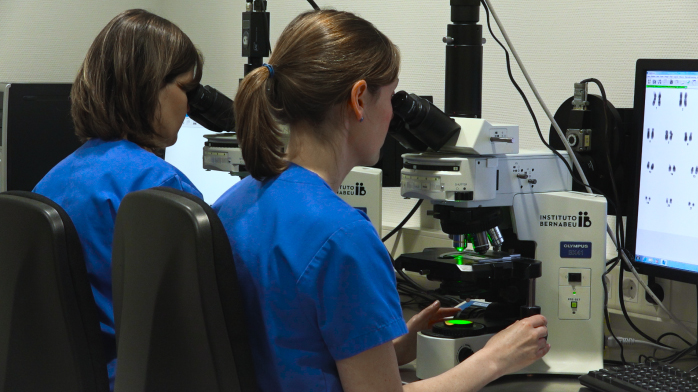IBgenRIF. A genetic study of implantation failure and repeated pregnancy loss
Analysing the genes that are linked to implantation failure and repeated pregnancy loss facilitates diagnosis and allows us to design personalised courses of treatment for each patient

How can we help you?
Non-obligation guidance
It is a ground-breaking study of the factors linked to embryo implantation and the development of a pregnancy and it provides important information for solving cases involving women who suffer from implantation failure and repeated pregnancy loss. It enables the team of doctors to understand if her genetic make-up is the reproductive issue so that she can be provided with an improved prognosis and so that a course treatment can be determined. This improves her chances of getting pregnant.
What does the IBGEN RIF test entail?
It is a ground-breaking study that seeks to analyse gene variants that have an impact on correct embryo implantation and pregnancy.
More specifically, the genes that are linked to thrombotic risk factors (prothrombin, factor V Leiden and MTHFR), immunology factors (IL-11 and APOE) and factors that modulate endometrial receptivity (p53 and VEGF).
How is the IBGEN RIF test performed?
A sample of saliva or blood taken from the patient is the necessary biological material in order for the laboratory at IB BIOTECH to extract sufficient DNA for studying the seven genetic variants that are linked to implantation failure and repeated pregnancy loss.
What are the advantages of the test?
Implantation failure and repeated pregnancy loss are a challenge for the field of reproductive medicine because the cause of this reproduction issue is not known in a significant number of patients. Performing the IBGEN RIF test improves diagnosis because it includes genetic variants that were not previously studied. As such, it is possible to provide the patient with an improved prognosis and appropriate therapeutic guidance. The medical specialist has access to more data in order to select a course of treatment in cases where this is medically possible and there is a pharmacological means of improving or solving the issue.
When is taking the test advisable?
In patients who, following several tests, still do not know what the cause of their infertility issue is.
Women who suffer from foetal losses or repeated miscarriages as well as patients who have been diagnosed with implantation failure who wish to understand the causes behind it.
The scientific basis for IBGEN RIF:
In over 4 years of research, our team of scientists analysed and identified the genes involved in implantation failure and repeated pregnancy loss. The conclusions of the study, as presented at the most significant scientific congresses in the field and published in prestigious medical journals, facilitated an in-depth understanding of the impact of each genotype on repeated pregnancy loss and implantation failure. Putting this knowledge to use is hugely beneficial to patients who have these pathologies because it means their diagnosis can be improved and a prognosis can be determined. It is also possible to guide them in their course of treatment in order to achieve a full term pregnancy.
A. Turienzo, B. Lledó, J. A. Ortiz; R. Morales; J. Ten, J. Ll. Aparicio, R. Bernabeu. Relevance of SNP on p53, IL-11, IL-10, VEGF and APOE in patients with repeated implantation failure (RIF) and pregnancy loss (RPL). Hum Fertil (Camb) 2018. In press
Lledo B, Turienzo A, Ortiz JA, Morales R, Ten J, Ll. Aparicio J, Bernabeu R. Negative effect of P72 polymorphism on p53 gene in IVF outcome in patients with repeated implantation failure and pregnancy loss. J Assist Reprod Genet. 2014 Feb;31(2):169-72.